A Plea for the Schoolgirls Captured by Boko Haram

Leaning forward and speaking softly into a small handheld lapel microphone, Dorcas uttered what must have seemed an anemic reflection on two years of captivity at the hands of one of the most violent terrorist organizations in the world: "There is no kind of suffering we haven't seen."
As the camera panned out to focus on the almost 50 other young women, all of whom are said to be part of the kidnapped #BringBackOurGirls, one could almost hear the heart-wrenching emotion of Chibok parents who would watch the video repeatedly to find their beautiful daughters; some sitting, some standing, some crying, some holding babies born from the rapes of forced "marriages."
All of whom carry the weight of depths of pain and horror far beyond their teenage years inflicted at the hands of what is now considered the most lethal global terrorist organization. Amina, the only young lady to have escaped over this long ordeal, has described the scene of watching her teenage friend being lowered into a hand-dug hole up to her neck and being stoned to death.
For the last 800 days, since April 2014, Dorcas and these other young ladies have seen birthdays come and go and the months tick by without rescue or release. And now from deep within the shadows of the Sambisa Forest, Dorcas, who turned 18 this past June, has been thrust front and center into a reprehensible battle for the soul of Boko Haram. Two questions loom large: why now and why Dorcas?
Two weeks ago, a breakaway Boko Haram faction claimed the mantle of leadership, pledged their allegiance to the Islamic State and issued their renewed promise to destroy the religious minorities of northern and central Nigeria or in their more acerbic words, "booby-trapping and blowing up every church that we are able to reach, and killing all those who we find from the citizens of the cross."
Ten days later, Abubakar Shekau, the violent leader and architect of Boko Haram since 2009, released this video perhaps as a twisted display of strength and ongoing leadership control. Whatever the reason, that these young ladies — whose only crime was to pursue an education — are now to be used as public tools of bargaining and validation is reprehensible. It was left to Dorcas to help play the part of a pleading captive imploring the Nigerian government to save these young ladies by releasing imprisoned Boko Haram terrorists back to the open battlefield.
Why should Dorcas be forced to wear this heavy mantle? Why should Dorcas be forced to become a public communicator on behalf of a marauding insurgency that has done little except to inflict pain on her, her family and thousands more?
Dorcas was so-named by her mother to honor a New Testament leader "full of good works" with a well-regarded reputation for personally making and distributing clothes to widows and the poor. Perhaps Dorcas is living up to her name. If so, she is certainly following the powerful example of her mother Esther.
For two years Esther Yakubu has been a rock of public and vocal support that the Nigerian government and the international community must not allow these girls to be fractured and forgotten. Just a few weeks ago Esther released a powerful letter of hope to her daughter. It is a sobering reflection on dreams interrupted and families torn apart.
This family is certainly not alone. Since 2009, Boko Haram has destroyed 910 schools, killed 611 teachers and left 950,000 children without an education. 2.5 million children under the age of five and pregnant and lactating women are in need of immediate assistance in northeastern Nigeria. Just this week a new report was released on the 10,000 kidnapped boys of Boko Haram and children as young as five learning to handle assault rifles. The true legacy of Boko Haram may perhaps be the haunting memory of ugly talons that have clawed their way into the next generation.
But this is a plea for Dorcas.
It is a plea for people of all faiths to issue profound prayers for deliverance for Dorcas and all the other families whose lives have been ripped asunder. It is a plea for communities of all faiths to stand with Nigeria in partnership and solidarity.
It is a plea that we as nation committed to the advancement of human rights and the flourishing of dignity express our highest commitment. Nothing would send a stronger and clearer signal than for President Obama to immediately appoint a Special Envoy for Nigeria and the Lake Chad region. We must act and we must act now.
This is a plea for thousands of young girls and boys. This is a plea for Dorcas.





























